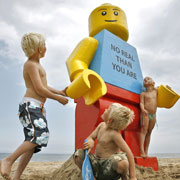That’s what one criminology professor says in an interview (Dutch). Henk van de Bunt, who last year co-wrote a report on the growing of marijuana in the Netherlands and the growing interest organised crime has in it, says continuing foreing pressure as well as this growing criminalisation of softdrugs that will lead to the end of the Dutch tolerance for it. The problem is that while buying and selling softdrugs is tolerated (not legal, just not actively prosecuted), growing it and selling it wholesale isn’t. And while growing weed once was done by amateur and homegrowers, organised crime has gotten increasingly involved with it. It’s this creeping criminalisation that will be the death of the coffeeshop, according to van de Bunt.
Now there have always been predictions about the end of tolerance as long as this policy has existed, but this time this prediction might be more accurate than usual. In the past decade the Dutch police has become much more aggressive in combatting the growing marijuana, which has driven out the amateurs and hobbyists as they can’t take the risks anymore. Meanwhile political pressure, both on council and national level to limit tolerance has increased as well. A few weeks ago for example two councils near border with Belgium decided to close down all coffeeshops in their cities because of troubles caused by drugs tourism, while the current government has pledged to forbid coffeeshops from opening near schools.
This is all part of an unspoken campaign to end tolerance of softdrugs not be explicitely ending it, but by making it so unworkable that it has to be ended. By going after the homegrowers the police has encouraged the spread of organised crime into the cannabis trade, which makes the case for ending tolerance that much easier. You can’t argue that ending tolerance will drive the trade udnerground if much of it already is in the hands of the mob anyway. The other prong of this campaign is to put more and more “reasonable” restrictions and demands on coffeeshops, to make it harder to open one or keep one open, death by a thousand cuts. To completely end tolerance has not yet been politically viable, but the van de Bunt is right to think it’s not that far off anymore, thanks to this silent campaign.
A better solution would be to legalise softdrugs completely, both retail and wholesale and make the growth of them a state monopoly. Chances of that happening are not so good though…
(Crossposted from Wis[s]e Words.)


